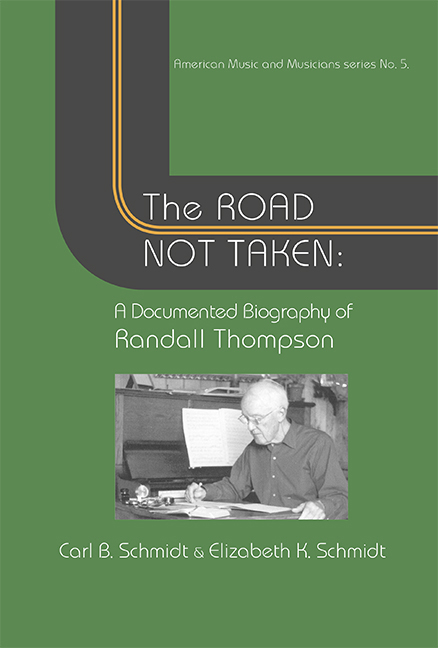Book contents
- Frontmatter
- Contents
- List of Illustrations
- List of Tables
- Library Sigla and Abbreviations
- Guide to Harvard University and Oberlin College Collections Referenced by Box Number
- Preface: Gateway to a Career
- Acknowledgments
- Chapter I Family History and Formative Years
- Chapter II Undergraduate Study at Harvard College (1916-20)
- Chapter III Lessons with Ernest Bloch and Graduate Study at Harvard University (1920-22)
- Chapter IV Damrosch Fellowship Years at the American Academy in Rome (1922-25)
- Chapter V Courtship and Marriage (1925-27)
- Chapter VI New York City—Wellesley College—A Guggenheim Fellowship (1927-31)
- Chapter VII Guest Conducting, Reception of Symphony no. 2, and College Music: An Investigation (1931-35)
- Chapter VIII Life after College Music: An Investigation (1935-37)
- Chapter IX The University of California at Berkeley (1937-39)
- Chapter X Curtis Institute of Music: The Hiring Process (Spring and Summer 1939)
- Chapter XI Curtis Institute (Fall 1939-Spring 1941)
- Chapter XII The University of Virginia (Fall 1941-Spring 1945)
- Chapter XIII Princeton University (Fall 1945-Spring 1948)
- Chapter XIV Return of a Favored Son: Harvard University (Fall 1948-Spring (1957)
- Chapter XV Harvard University (Summer 1957 to July 1, 1965)
- Chapter XVI The Early Retirement Years (1965-75)
- Chapter XVII The Final Years (1975-84)
- Chapter XVIII Recapitulation and Coda
- Bibliography of Works Cited by Abbreviations
- Index
Preface: Gateway to a Career
- Frontmatter
- Contents
- List of Illustrations
- List of Tables
- Library Sigla and Abbreviations
- Guide to Harvard University and Oberlin College Collections Referenced by Box Number
- Preface: Gateway to a Career
- Acknowledgments
- Chapter I Family History and Formative Years
- Chapter II Undergraduate Study at Harvard College (1916-20)
- Chapter III Lessons with Ernest Bloch and Graduate Study at Harvard University (1920-22)
- Chapter IV Damrosch Fellowship Years at the American Academy in Rome (1922-25)
- Chapter V Courtship and Marriage (1925-27)
- Chapter VI New York City—Wellesley College—A Guggenheim Fellowship (1927-31)
- Chapter VII Guest Conducting, Reception of Symphony no. 2, and College Music: An Investigation (1931-35)
- Chapter VIII Life after College Music: An Investigation (1935-37)
- Chapter IX The University of California at Berkeley (1937-39)
- Chapter X Curtis Institute of Music: The Hiring Process (Spring and Summer 1939)
- Chapter XI Curtis Institute (Fall 1939-Spring 1941)
- Chapter XII The University of Virginia (Fall 1941-Spring 1945)
- Chapter XIII Princeton University (Fall 1945-Spring 1948)
- Chapter XIV Return of a Favored Son: Harvard University (Fall 1948-Spring (1957)
- Chapter XV Harvard University (Summer 1957 to July 1, 1965)
- Chapter XVI The Early Retirement Years (1965-75)
- Chapter XVII The Final Years (1975-84)
- Chapter XVIII Recapitulation and Coda
- Bibliography of Works Cited by Abbreviations
- Index
Summary
“I’m glad I’ve done more than compose. The other jobs make composing more interesting,” remarked Randall Thompson when interviewed in 1950. By then he was an eminent professor at Harvard University whose thirty-year career following graduation from Harvard in 1920 had already included study abroad, teaching, composing, conducting, accompanying, researching, writing, and work as an administrator. Although today Thompson is pri¬marily thought of as a composer of choral music sung by tens of thousands around the world, the simple fact is that the greater part of his career was spent as an academic. Teaching was his most important priority, one that often left him little time for composition. He was a distinguished and sought after music educator whose ability to lead as an administrator and whose superb educational vision and integrity have left an indelible mark on music education in the United States. He loved to travel, especially to his beloved Gstaad, Switzerland, and reveled in Italian culture.
The seminal event in his early career—one that drew great attention to him, both positive and negative—occurred when he returned to America in the early 1930s following a John Simon Guggenheim Fellowship that saw the composition of his highly-regarded Symphony no. 2 in E minor. Thomp¬son had relinquished his untenured teaching position at Wellesley College in 1929 to accept the Guggenheim, which was subsequently renewed for a sec¬ond year. Married with two children and with a third due in July, he returned home in May 1931 staying with his wife Margaret's parents in Montclair, New Jersey while looking for a full-time academic position to support his family. None having materialized, he quickly accepted part-time positions as guest conductor of the Dessoff Choirs during Margarete Dessoff's leave of absence and of the Madrigal Choir and Supervisors's Chorus at the Juil¬liard Graduate School. For the Dessoff Choirs he wrote his satirical piece Americana (commissioned by The League of Composers) on texts by H. L. Mencken. He also published occasional articles in Modern Music, Musical America, and Musical Quarterly and contributed a number of book reviews to the Saturday Review of Literature. A significant opportunity came in late 1931 when an Association of American Colleges “Subcommittee on selec¬tion of director” unanimously nominated him “for director of the investiga¬tion of college music under the sponsoring committee.”
- Type
- Chapter
- Information
- The Road Not TakenA Documented Biography of Randall Thompson, 1899–1984, pp. xxxi - xxxvPublisher: Boydell & BrewerPrint publication year: 2018



